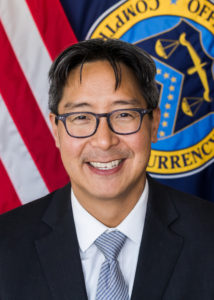
Banks should see fairness as a way to spark innovation rather than an inhibitor, said Acting Comptroller Michael Hsu on March 25 during a Consumer Bankers Association conference.
Hsu said banks have too often seen fairness as coming at the expense of innovation. “By elevating fairness, banks can improve their ability to anticipate and adapt to emerging compliance risk issues,” he added. “The stronger a bank’s ability to do that, the less it will need to look over its shoulder at its regulators and the more degrees of freedom it will have to innovate and create banking products ‘for the people.’
Hsu said an effective risk management compliance program coupled with a strong sense of fairness will also protect vulnerable customers from being trapped into “high-cost debt traps.” As an example, he cited bank overdraft fees. Banks started offering overdraft fees in the 1990s as a rarely-used service, but their use steadily grew over the next few decades. Hsu said fair lending compliance risks emerged as overdraft-related revenue topped $11 billion in 2015. Since then, bank overdraft revenue has fallen to approximately $6 billion.
Hsu said banks that changed their overdraft policies relatively early avoided the later regulatory scrutiny while strengthening retail deposits. “As with overdrafts, having a clear sense of where this fairness line is prior to the development and launch of such a product can help a bank avoid compliance risk issues down the road, when the product has grown and consumer harms are more apparent,” Hsu said.
He sees fairness considerations as including both disparate treatment and disparate impact. Hsu defines disparate treatment as a bank discriminating against a customer based on religion, sex, ethnicity, race or other protected characteristics. Disparate impact results in disparities that disadvantage certain groups. Banks must alleviate both, Hsu said.
Risk management challenges are evolving amid changes to the broader financial industry, he added. The share of credit cards used as payment methods has increased more than 50 percent since 2016, while the use of ‘buy now, pay later’ has also significantly increased since its introduction only a few years ago.
At the same time, Hsu said the expanding use of third-party arrangements amid digital banking has increased compliance and operational complexities while causing a steep rise in fraud. COVID-19 and social reckoning heightened attention on inequality, the wealth gap and financial inclusion barriers. In response, bankers are more aware of the importance of supporting financial inclusion and the impact of continued inequality, Hsu said.
“Successfully balancing innovation and growth with safety, soundness and fairness is getting harder,” Hsu added. “Consumer banking and compliance are more inextricably linked now than ever. This presents a challenge — and an opportunity — for banks and how they approach compliance risk management.”
Hsu also called on banks to pay attention to biases in consumer lending training data to account for the bias and discrimination risks posed by artificial intelligence and machine learning.
